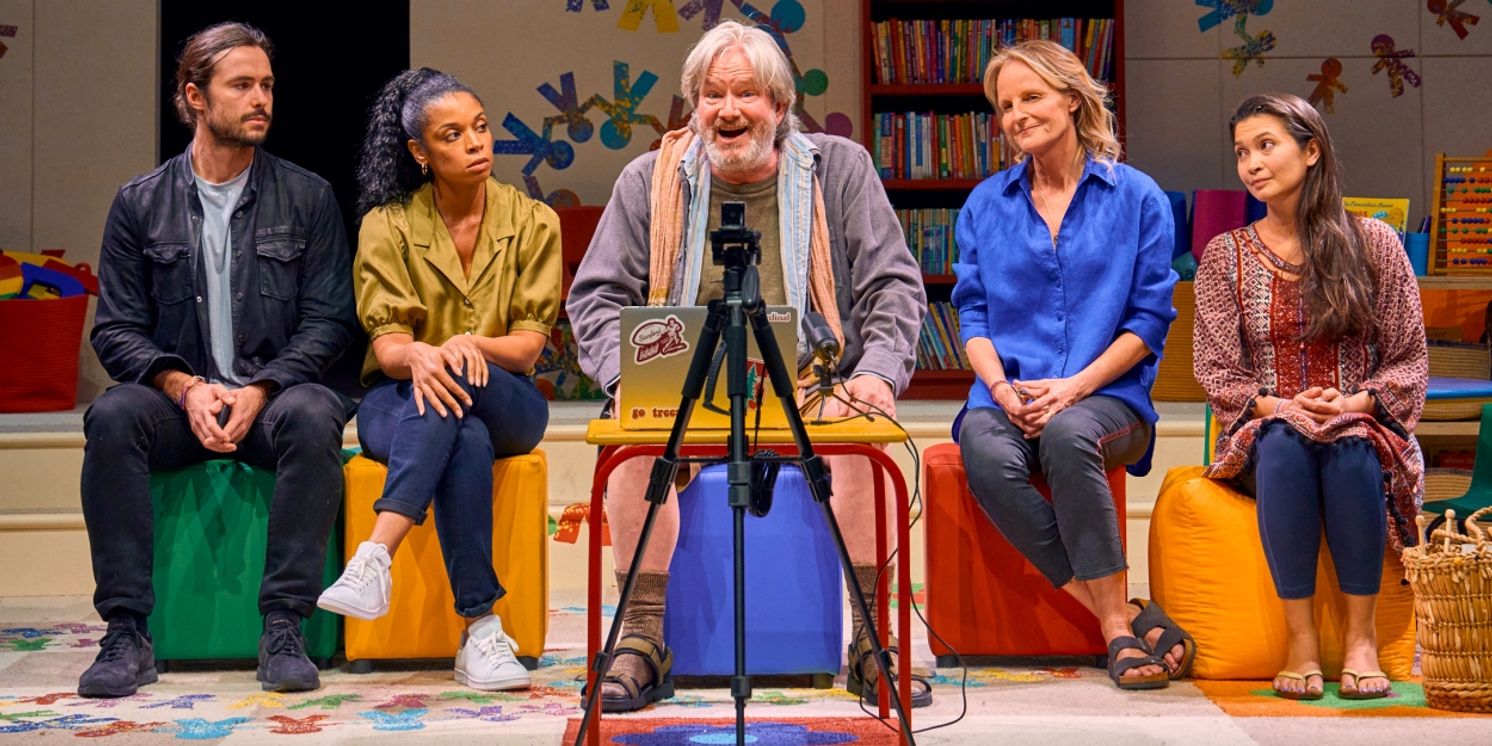Review: EUREKA DAY, Old Vic
Jonathan Spector's play treads a dangerous path.

![]() Jonathan Spector's much-anticipated comedy Eureka Day starring the Oscar-winning American actress and director Helen Hunt explores how a group of people with the same overt goals can diverge so wildly in their approaches to meeting them. By making its lead an opponent of vaccination, though, it treads a dangerous path.
Jonathan Spector's much-anticipated comedy Eureka Day starring the Oscar-winning American actress and director Helen Hunt explores how a group of people with the same overt goals can diverge so wildly in their approaches to meeting them. By making its lead an opponent of vaccination, though, it treads a dangerous path.
Set in the eponymous fictional private school in Berkeley, California, we spend the first half watching five members of the school board twist themselves this way and that in order not to offend anyone (except on occasion each other). Every aspect of the school's proceedings are rigorously policed for political correctness: students are only referred to in gender neutral terms and should "feel seen" but not "feel othered" while a production of Peter Pan was rid of its colonialist elements by setting it in space.
The board are a fun bunch to observe, at least at first. The meetings are run by Don (Mark McKinney), a man never short of a banality or Rumi quote who is happy to pair a scarf with cargo shorts, sandals and socks. Hunt's stern Suzanne has seen a number of her children pass through Eureka Day and is the group's matriarch. May (Kirsten Foster) is more interested in her fellow board member Eli (Ben Schnetzer) than in school politics. Adding fire to the mix is the newcomer Carina, a black mother whose race and pro-vaccine views spark some of the livelier exchanges.
When the board are notified of a case of the mumps amongst the students, they are soon divided between those who want to vaccinate and quarantine all the students and those who want to avoid a blanket approach in order to not offend parents. The inevitable solution is to throw this discussion open to all parents via an online call. Equally inevitable - and utterly hilariously - the parents disagree with each other, split between those who want to "follow the science" and the "anti-vaxxers" who fear Big Pharma and pin their hopes on homeopathic medicines. Finally and most inevitably, the arguments ends up adhering to Godwin's Law.
After the interval, Eureka Day turns into a very different beast. The laughs become far fewer and dark drama floats in. Pivoting around whether all pupils should be vaccinated, the ideological distance Carina and Suzanne grows exponentially. Meanwhile, a heartbroken May embraces honesty abandons the touchy-feely dynamics of before while Don does his level best to find a compromise, failing then flailing between the opposing sides before admitting "I am only here to facilitate".
Even when this play debuted in 2018, there was a clear split between those who want to "follow the science" and the "anti-vaxxers" who, harking to the fears over the MMR vaccine, worked off anecdata and pinned their hopes on homeopathic medicines or other unproven remedies. Both sides of the debate are given a decent airing with Hunt allowed plenty of time to describe how and why Suzanne is against vaccinations in general based on her experience and Carina putting forward the opposing view.
Eureka Day struggles in a couple of areas. The first is in getting points which make perfect sense to a Trump-era US audience over to a British audience in 2022. References to Rumi (the best-selling poet in the States, according to the BBC), the New Yorker and the intricacies of the American private schooling system will likely fly over many a Londoner's head. Moreover, Spector's allusions to the highly partisan political environment of the time may be too subtle for those watching not immersed in politics across the pond.
Eureka Day isn't short on laughs but the writing leaves something to be desired. May and Eli are severely underwritten and the vibrant subplot around their affair disappears quickly in the second half. Don gets most of the chuckles but he is essentially just a one-note comic device. Also, the tonal clash between the two halves of the play grinds the further on we go after the interval. Spector wants us to enjoy an avuncular The Vicar of Dibley-like comedy, a satire on liberal values and a philosophical drama but that becomes too much for the lightweight characterisations to carry.
The parallels between Eureka Day's conflicts and Covid-era battles are many and obvious, not least the right of individuals to decide for themselves versus the right of a community to protect the elderly and the young from an infectious disease. In the current scarcity of works that focus directly on that recent period, Eureka Day works on one level as a very funny examination of liberal society's attitudes to mask-wearing, jabs and social distancing.
On another level, it is a platform for dangerous anti-vaccine ideas considering that the Covid-19 threat is far from over. Here are some facts: a recent study published in the Lancet suggests that Covid-19 vaccinations have saved almost 20 million lives across 185 countries since being introduced less than two years ago; another study suggests that the first lockdown saved an estimated 3.2 million live across Europe.
Free speech has its place in theatre but so does the recognition that showcasing Eureka Day's ideas at a delicate time in a global health crisis and, especially in a venue as significant as the Old Vic and with a high-profile cast, gives anti-vaxxers a voice. Thus putting at risk the uptake and efficacy of future measures to contain this and future pandemics.
Eureka Day continues at the Old Vic until 31 October.
Photo Credit: Manuel Harlan
Reader Reviews
Powered by
|
Videos

